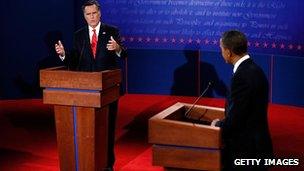European Court upholds UK political advert ban
- Published

An attempt to allow US-style political advertising on British TV has failed after European judges ruled the UK's blanket ban did not breach free speech.
Animal rights campaigners brought the legal challenge after they were banned from screening a TV advert.
But judges from the European Court of Human Rights (ECHR) ruled by 9 to 8 in favour of the government.
The government welcomed the verdict, saying the ban helped sustain a "balance of views" on British TV.
Animal Defenders International called it "a profoundly sad day for democracy".
The Grand Chamber of the Strasbourg court delivered its judgment in the long-running case amid UK concerns that a relaxation of the ban could lead to the airwaves being dominated by the political pressure groups with the deepest pockets.
'Wide support'
In 2005, Animal Defenders International (ADI) was blocked from screening a TV advertisement which juxtaposed images of a girl and a chimpanzee in chains in an animal cage.
The House of Lords upheld the ban in 2008 and the group then took the case to the European Court, claiming the prohibition breached the Article 10 right to freedom of expression.
The ruling by the smallest possible majority of the Strasbourg judges declared: "The court noted that both parties (ADI and the government) maintained that they were protecting the democratic process."
The judges said the ban only applied to advertising and ADI had access to "alternative media, both broadcast and non-broadcast".
The verdict concluded: "Overall, the court found that the reasons given to justify the ban were convincing and that the ban did not therefore go too far in restricting the right to participate in public debate."
Culture Secretary Maria Miller said: "We welcome the fact the European Court has upheld the UK's blanket ban on political advertising.
"Political adverts are - and have always been - banned on British TV and radio. That ban has wide support and has helped sustain the balance of views which is at the heart of British broadcasting - and ensures the political views broadcast into our homes are not determined by those with the deepest pockets."
'Arms race'
ADI chief executive Jan Creamer said: "It is unjust that companies can advertise without being challenged," she said.
"This judgment has denied the right of ADI and other similar campaign and advocacy groups to refute advertising claims made by companies."
A statement by ADI said the advert was tailored to comply with broadcasting rules but was banned because ADI was deemed to be a "political" group.
"At present, advertising laws effectively ban the broadcast of any advertisement on a matter of controversy. So, whilst primates and other animals can be used to sell products or services, it is not permitted to create awareness about the impacts of these actions on those animals," said the statement.
The Electoral Reform Society welcomed the verdict, saying that lifting the ban would have escalated an "arms race" on political spending.
Chief executive Katie Ghose said: "This ruling should be welcome news to all democrats. Lifting the ban would have irrevocably changed the political landscape in Britain, and not for the better."
She added: "The US experience shows the only people who would profit from TV attack ads are moneyed interest groups, TV networks and paid political consultants. The biggest loser would be democratic debate in Britain."
- Published18 April 2013
- Published13 March 2012
- Published17 April 2012